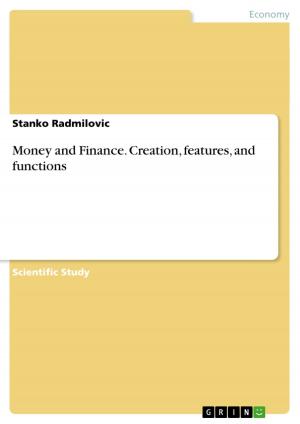Beckett's Catastrophe - A Play about Power and Impotency
A Play about Power and Impotency
Fiction & Literature, Literary Theory & Criticism, British| Author: | Daniela Esser | ISBN: | 9783638141086 |
| Publisher: | GRIN Verlag | Publication: | September 5, 2002 |
| Imprint: | GRIN Verlag | Language: | English |
| Author: | Daniela Esser |
| ISBN: | 9783638141086 |
| Publisher: | GRIN Verlag |
| Publication: | September 5, 2002 |
| Imprint: | GRIN Verlag |
| Language: | English |
Seminar paper from the year 2001 in the subject English Language and Literature Studies - Literature, grade: very good, University of Paderborn (Anglistics), course: Proseminar: Post-1970 Beckett, 15 entries in the bibliography, language: English, abstract: Early in 1982, Samuel Beckett was one of the first writers to respond to an invitation from the Association Internationale de Défense des Artistes (AIDA) for contributions of works to show support for Václav Havel, the Czech playwright who was serving a prison sentence for his dissident activities. In 1979 Havel had been sentenced by the Czechoslovak communist regime to four and a half years imprisonment for subversion. He was co-founder and spokesman of the Charter 77 initiative as well as a member of the Czech Committee for the Defence of the Unjustly Persecuted (VONS). Shocked to hear that Havel had been forbidden to write, which must have 'seemed the ultimate oppression'2, Beckett wrote Catastrophe3 and dedicated the play to Havel. It was first performed as part of `Une nuit pour Václav Havel' at the Avignon Theatre Festival in July 1982.4 Knowlson, referring to Beckett's refusal to employ didactic impulses in his writing, mentions that Beckett sometimes regretted his incapability 'to write anything that dealt overtly with politics'5, but the biographer also asserts that Beckett utterly rejected political implications in his writing.6 However, with the invitation of AIDA, he could show his solidarity with a 'victimized, imprisoned fellow writer'7 who took a courageous stand against abuses of human rights. Nonetheless, a political reading of Catastrophe is grounded on the victimization of the Protagonist by the dictatorial Director. The play has also been identified as a 'parable of Man and Satan' (see 2.2). In his biography Damned to Fame. The Life of Samuel Beckett, Knowlson argues that the play has also been related to Beckett's 'own horror of self-exposure, and linked to the essentially exhibitionistic nature of theatre.'8 [...] _______ 1 Sartre, Jean-Paul: Geschlossene Gesellschaft. (Orig. Huis clos). Trans. Traugott König. Hamburg: Rowohlt, 1991, p. 59. 2 Knowlson, James: Damned to Fame. The Life of Samuel Beckett. London: Bloomsbury, 1996, p. 678. 3 Beckett, Samuel: Catastrophe. In: Collected shorter plays, London: Faber and Faber, 1984, pp. . 295-301. Hereafter cited as Catastrophe. 4 See Knowlson, James: Damned to Fame. The Life of Samuel Beckett. London: Bloomsbury, 1996, p. 677. 5 Ibid., p. 678. 6 Cf. ibid., p. 678. 7 Ibid., p. 678. 8 Ibid., p. 679.
Seminar paper from the year 2001 in the subject English Language and Literature Studies - Literature, grade: very good, University of Paderborn (Anglistics), course: Proseminar: Post-1970 Beckett, 15 entries in the bibliography, language: English, abstract: Early in 1982, Samuel Beckett was one of the first writers to respond to an invitation from the Association Internationale de Défense des Artistes (AIDA) for contributions of works to show support for Václav Havel, the Czech playwright who was serving a prison sentence for his dissident activities. In 1979 Havel had been sentenced by the Czechoslovak communist regime to four and a half years imprisonment for subversion. He was co-founder and spokesman of the Charter 77 initiative as well as a member of the Czech Committee for the Defence of the Unjustly Persecuted (VONS). Shocked to hear that Havel had been forbidden to write, which must have 'seemed the ultimate oppression'2, Beckett wrote Catastrophe3 and dedicated the play to Havel. It was first performed as part of `Une nuit pour Václav Havel' at the Avignon Theatre Festival in July 1982.4 Knowlson, referring to Beckett's refusal to employ didactic impulses in his writing, mentions that Beckett sometimes regretted his incapability 'to write anything that dealt overtly with politics'5, but the biographer also asserts that Beckett utterly rejected political implications in his writing.6 However, with the invitation of AIDA, he could show his solidarity with a 'victimized, imprisoned fellow writer'7 who took a courageous stand against abuses of human rights. Nonetheless, a political reading of Catastrophe is grounded on the victimization of the Protagonist by the dictatorial Director. The play has also been identified as a 'parable of Man and Satan' (see 2.2). In his biography Damned to Fame. The Life of Samuel Beckett, Knowlson argues that the play has also been related to Beckett's 'own horror of self-exposure, and linked to the essentially exhibitionistic nature of theatre.'8 [...] _______ 1 Sartre, Jean-Paul: Geschlossene Gesellschaft. (Orig. Huis clos). Trans. Traugott König. Hamburg: Rowohlt, 1991, p. 59. 2 Knowlson, James: Damned to Fame. The Life of Samuel Beckett. London: Bloomsbury, 1996, p. 678. 3 Beckett, Samuel: Catastrophe. In: Collected shorter plays, London: Faber and Faber, 1984, pp. . 295-301. Hereafter cited as Catastrophe. 4 See Knowlson, James: Damned to Fame. The Life of Samuel Beckett. London: Bloomsbury, 1996, p. 677. 5 Ibid., p. 678. 6 Cf. ibid., p. 678. 7 Ibid., p. 678. 8 Ibid., p. 679.















